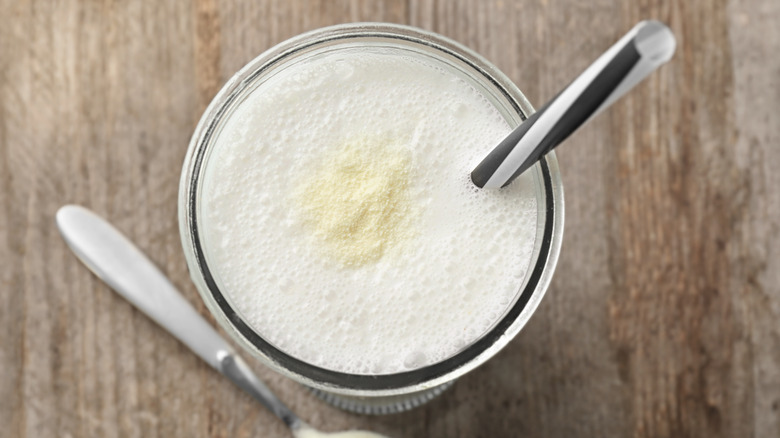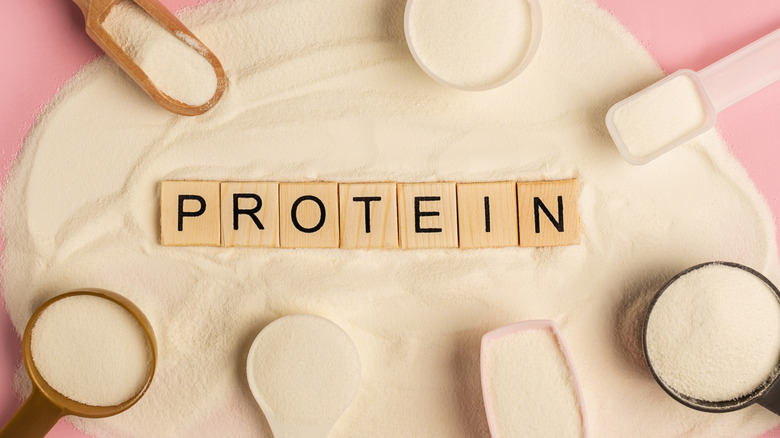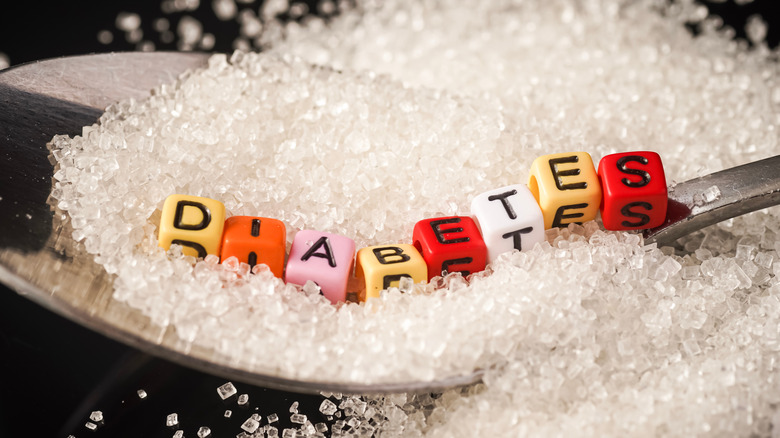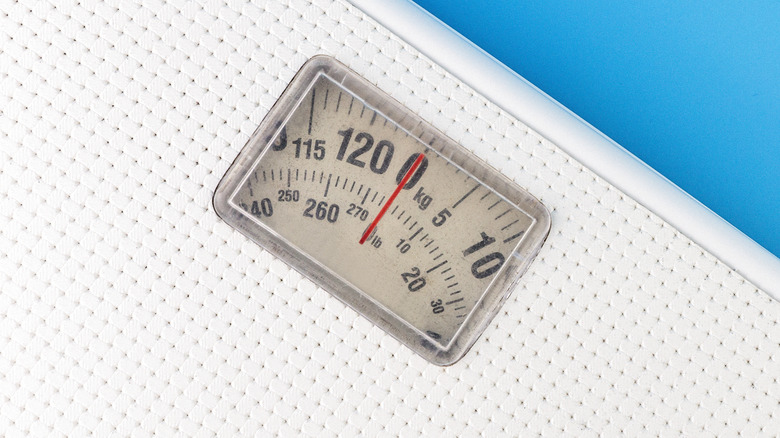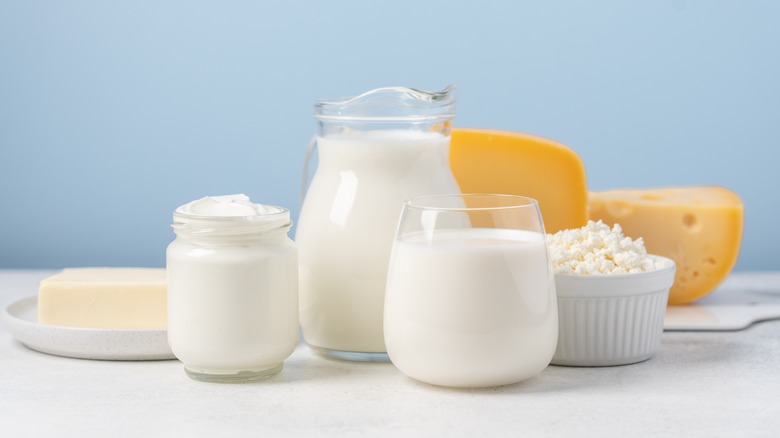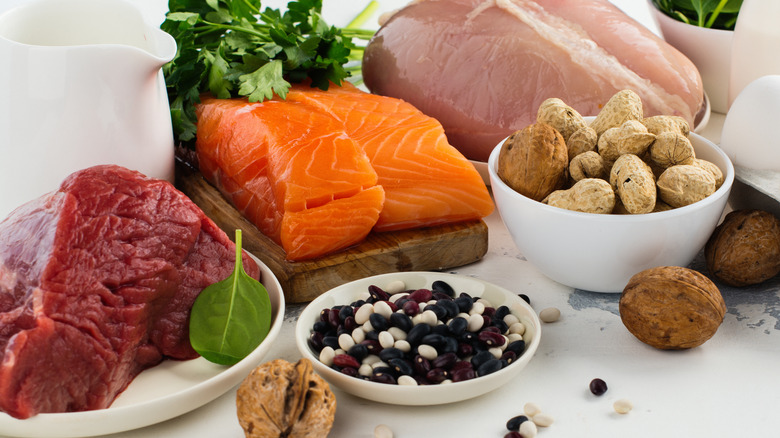Is Muscle Milk Good For You?
There are a variety of Muscle Milk products, and as you might expect, the ingredients do vary between them. For instance, as Livestrong points out, there are three main ingredients in Muscle Milk 100% Whey Protein Powder: maltodextrin, whey protein concentrate, and whey protein isolate. While maltodextrin is also a main ingredient in Muscle Milk Genuine Protein Powder, the Genuine Protein Powder has 11 main ingredients that include crystalline fructose, alkalized cocoa powder, calcium phosphate, canola oil, and soluble corn fiber.
But different ingredients aren't the only things you should check on a Muscle Milk Nutrition Facts Label. You'll also want to compare and contrast other nutritional factors like calories, fiber content, and the amount of sodium per serving for different Muscle Milk products. Let's take Muscle Milk Genuine Chocolate protein powder, for example. Yes, it has protein (32 grams per serving, a serving being is 70 grams), but that one serving also has 280 calories. What's more, each serving has 135 milligrams of sodium, 40 milligrams of cholesterol, 9 grams of fat, and 20 grams of carbs. Nutrients-wise, it has minerals like iron, calcium, potassium, and phosphorus, as well as vitamins like A, C, and D. The bottom line is that it's important to not just research brands but also individual products within those brands.
With that said, however, is Muscle Milk really good for you? Here's what you need to know.
Muscle Milk might help you build muscle
Since the word "muscle" is in its name, it's not a big leap to connect Muscle Milk with building muscles. But a conscientious consumer knows that it's important to look beyond a product's name to get the full story.
As sports nutrition researcher Dr. Jay Hoffman told Healthfully, if a person is training and trying to develop their muscles, protein supplements like Muscle Milk can lead to more muscle growth than just exercising. However, Dr. Hoffman says that one should consume protein supplements right before working out to achieve that higher level of muscle growth. Keep in mind that Muscle Milk products can contain whey protein, which your body completely breaks down in about half an hour. This means you have a brief window where your body has large amounts of protein ready to fuel your muscles.
So, does all of this mean you shouldn't drink Muscle Milk after a workout? No, but you need to pick the right Muscle Milk product. As Discovery Magazine notes, while whey protein gets into your system faster, casein protein (which can also be found in Muscle Milk products) takes longer to process. So, protein powder that contains casein protein might be a good choice to consume right before bed to continue to support your muscles' growth and development. But you should always work with a healthcare professional to craft the best exercise and meal plan for you.
It might affect your appetite
If you look at advertising for Muscle Milk, quite a bit of it is about increasing muscle mass (via Livestrong). But what about weight? Well, there are some big pros and cons when it comes to Muscle Milk, weight, and appetite.
First, if you want to lose weight or just improve your weight management, you should always talk to a healthcare professional. Second, even if a professional tells you that Muscle Milk products are alright for your meal plan, that doesn't mean you should consume them instead of other foods. As Livestrong points out, the manufacturer of Muscle Milk states that you shouldn't get nutrients only from their products. But with all that said, there's data supporting that beverages that contain large amounts of fat and protein can help one feel fuller, keep muscles lean, and yes, possibly contribute to weight loss (via the Mayo Clinic). In particular, protein can leave one feeling satisfied, and thus less likely to consume additional calories.
Speaking of calories, it's important to remember that different Muscle Milk products can vary in terms of their calories (per Livestrong). As an article in the Yale Journal of Biology and Medicine (as cited by Livestrong) pointed out, consuming artificial sweeteners like the kind found in different Muscle Milk products could leave you hungrier especially for sugar.
People with certain chronic conditions may want to ask a doctor
Three words are crucial for all diabetics: blood sugar management. Someone with diabetes needs to make sure their blood sugar doesn't spike or drop. Foods that contain protein could be a helpful part of a blood sugar management diet, since our bodies process protein at a slower rate than carbs (via Medical News Today). Okay, so this means that Muscle Milk products must be good for diabetics because of their protein content, right? Well, it's not that simple.
As Medical News Today explains, packaged protein drinks can contain sugar. For example, the U.S. Department of Agriculture (USDA) states 100 grams of Muscle Milk powder contain not only 45.7 grams of protein, but also 5.71 grams of sugar. The same amount of Muscle Milk Light is a little better sugar-wise (4 grams) and is higher in protein (50 grams), per USDA. So, being a conscientious consumer is important. But to really do your homework when it comes to a product means looking beyond the food label.
According to WebMD, Consumer Reports found in 2010 that different protein drink brands (including Muscle Milk) could contain possibly dangerous amounts of heavy metals like lead and cadmium, as well as additional harmful substances. The Consumer Reports editor for the investigation, Andrea Rock, said that certain individuals like diabetics are potentially more vulnerable to health problems if exposed to these metals and substances. However, the protein drink manufacturers stated that the investigation was flawed.
You may experience some digestive issues
Imagine this: Two friends drink Muscle Milk. Later, one feels nauseous, but the other is fine. They assume it can't be the Muscle Milk, since only one of them had stomach problems. However, that isn't necessarily the case.
As SteadyHealth explains, Muscle Milk, as well as other protein drinks, can cause nausea, as well as diarrhea and abdominal cramps. In fact, overdoing your protein intake could cause a number of health issues, including digestive problems and dehydration, per CBS News. Okay, but why did only one person in the above scenario experience stomach issues from Muscle Milk? Well, did both friends drink the same amount of Muscle Milk? Also, did the two friends drink the same Muscle Milk product? Because the ingredients can vary, and protein isn't the only ingredient found in different Muscle Milk products that might cause problems with the digestive system.
For example, you can also experience gas and bloating because from Muscle Milk products that contain crystalline fructose. As Healthline notes, some individuals can have fructose malabsorption where they have difficulty breaking down fructose in their intestines. If this occurs, they might experience not just gas and bloating, but also abdominal pain, nausea, vomiting, and diarrhea.
You might gain weight
There is a great deal of focus on weight loss. But as Discover Magazine points out, there are reasons why someone would want to gain weight, including increasing their muscle mass. In fact, Discover Magazine ranked 20 different protein powders for their ability to help one gain weight — and Genuine Muscle Milk Protein Powder was ranked 15th because of its protein and calorie content.
Vandana Sheth, a registered dietitian and nutritionist, told Men's Health, "Protein plays an important role in muscle growth." She also confirmed that it might help one gain weight, but added that "[f]or those trying to gain weight, it's important to get more overall calories in than the body is able to use." As a matter of fact, data supports that protein can leave one more satisfied, which could affect appetite and weight.
Of course, individual goals are important when incorporating products like the kind made by Muscle Milk for a weight gain meal plan. For example, a person trying to gain muscle mass could find high amounts of protein very useful, but perhaps not an equally high amount of fat and carbs, per Discover Magazine. On the other hand, someone who is underweight might find that focusing on adding calories is a good way to increase their weight gain. Plus, the amount of vitamins and minerals in a product can be a factor for someone who is underweight because they are malnourished.
Some people could experience an allergic reaction
Sometimes, the name of a food can be confusing. For instance, the infamous Rocky Mountain Oysters aren't shellfish. And in 2011, the U.S. Food and Drug Administration (FDA) sent a warning letter to the manufacturers of Muscle Milk, stating that the word "milk" in its name led the public to believe a Muscle Milk drink has milk in it when it "contains no milk" (via the Seattle Times). But that doesn't mean someone with a milk allergy shouldn't still be wary of Muscle Milk.
To really understand how Muscle Milk could trigger a milk allergy, we need to talk about whey protein. As Healthline explains, whey protein not only comes from milk, but also can be found in Muscle Milk products. And the Mayo Clinic warns that anyone who is sensitive or allergic to dairy shouldn't consume whey protein. In addition, whey protein can interfere with how well your body absorbs certain antibiotics. It also could interact with drugs like albendazole and alendronate.
Besides whey protein, casein protein (another component of milk) can also be found in Muscle Milk products, per Healthline. In fact, according to WebMD, casein protein is what gives milk its color. This type of protein can trigger a reaction in individuals who are allergic to milk. It's important to read all the ingredients carefully on a Nutrition Facts Label, and not just skim it for specific words like "milk."
It could be a bad choice for someone with CKD
As the American Kidney Fund explains, your kidneys have multiple functions, including filtering waste and excess fluid from your bloodstream. But when someone has CKD (chronic kidney disease), their kidneys aren't functioning as well as they should. CKD has five stages, and with each stage, the kidneys' ability to function becomes worse.
Since kidneys filter waste, diet can play a role in treating CKD. The National Kidney Foundation advises that if someone is at any of the first four stages of CKD, they need to be careful about their protein intake. This is because consuming excess protein means more for the kidneys to filter from your bloodstream (via Livestrong). This can put a strain on these vital organs if you have health problems like CKD. Muscle Milk products can contain large amounts of protein, making them a potentially bad choice for someone with kidney-related health issues.
If your kidneys are healthy, then extra protein in your system shouldn't be a problem for your kidneys. However, it's important to have regular check-ups to make sure all the parts of your body are functioning normally. In the case of CKD, a medical professional might do an estimated Glomerular Filtration Rate (eGFR) test, where they test for the amount of a specific waste product in your blood to determine how well (or poorly) your kidneys are functioning (per the American Kidney Fund).
Muscle Milk was the subject of a lawsuit
The U.S. Food and Drug Administration (FDA) sent the producers of Muscle Milk a warning letter in 2011 that Muscle Milk "contains no milk" (via Seattle Times). The following year, the company faced a lawsuit not about Muscle Milk's name, but its advertising.
The law firm Baron and Budd filed the suit against the makers of Muscle Milk products, CytoSport, Inc., claiming that the company "intentionally mislabels" its products as "healthy" and as a weight loss aid (per Business Wire). The lawsuit compared Muscle Milk products to a Krispy Kreme donut in terms of their fat and saturated fat content, as well as their calories. According to Healthline, CytoSport, Inc. marketed Muscle Milk as having "healthy fats" prior to the Baron and Budd lawsuit. The lawsuit also alleged that the energy bars of the Muscle Milk line "contain other unhealthy ingredients like fractionated palm kernel oil."
Besides ingredients, the lawsuit also cited advertising phrases like "go from cover it up to take it off" and "from frumpy to fabulous" to further support their argument that Muscle Milk's advertising is misleading. The year after Baron and Budd brought the lawsuit against the makers of Muscle Milk products, CytoSport, Inc. agreed to pay $5.3 million as a result of the suit (via Healthline).
It's best to get your protein elsewhere
There's no denying that Muscle Milk products can be a source of protein. In fact, some Muscle Milk products literally have the word "protein" in their name. But a 2010 investigation by Consumer Reports found that other ingredients found in Muscle Milk products could be dangerous (via CBS News).
Consumer Reports tested the amount of heavy metals in 15 different protein drinks. The results showed that both Muscle Milk-Chocolate and Muscle Milk-Vanilla Crème contained lead, and that the former also contained cadmium. The supplements industry disputed the investigation's findings, with Andrew Shao of the Council for Responsible Nutrition telling CBS News that "[t]he heavy metals that were found are well below the limits FDA (Food and Drug Administration) would be concerned about, so they don't pose a health risk to consumers at all." However, as Consumer Reports' Urvashi Rangan put it: "What we're concerned about here is the chronic low level exposure of a heavy metal." She also explained that heavy metals tend to remain in someone's body "for a long period of time."
Does this mean products like Muscle Milk are completely off the table? Well, the Cleveland Clinic notes that whey powder can be an option for protein. However, the Clinic clarifies that the proteins that come from animal-based products are the easiest for your body to absorb, while also recommending plant-based protein options like quinoa, seeds, soy products, and legumes.

